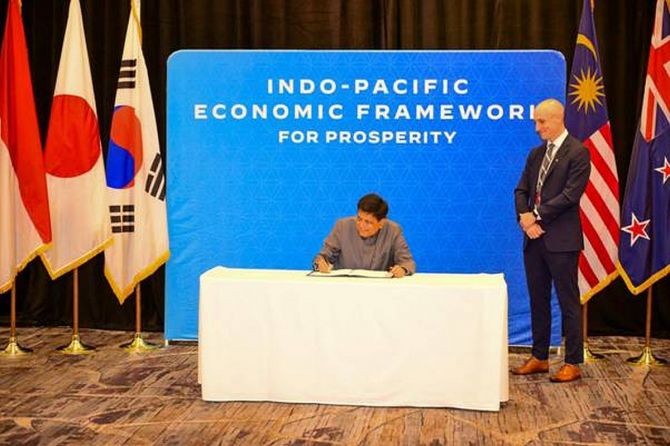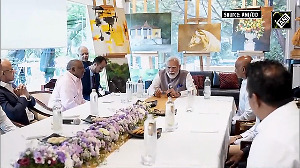India, the US and 12 other members of the IPEF grouping have signed a supply chain resilience agreement that would help mitigate risks of economic disruptions from supply chain shocks and improve crisis coordination.

The agreement would help member countries like India to reduce their dependence on China and provide timely information to the IPEF member countries about potential supply disruptions.
The COVID outbreak severely disrupted the global supply chain, as most countries were dependent on China for various products like pharma raw materials.
The agreement was signed in San Francisco, where Commerce and Industry Minister Piyush Goyal is attending the ministerial meeting of the Indo-Pacific Economic Framework For Prosperity (IPEF).
"India joins the US and 12 other IPEF partners to ink the IPEF Supply Chain Resilience Agreement, a first-of-its-kind international agreement that will fortify and strengthen global supply chains; and foster adaptability, stability and sustainability," Goyal said in a post on the social networking platform X on Wednesday.
Members of the bloc concluded the negotiations on this agreement, one of the four pillars of the IPEF, on May 27 this year in Detroit.
The pact will also seek to improve crisis coordination and response to supply chain disruptions and work together to support the timely delivery of affected goods during a crisis.
Three new IPEF Supply Chain bodies could be set up to facilitate cooperation among the partners.
The bodies will be - the supply chain council; the supply chain crisis response network, and the IPEF Labor Rights Advisory Board.
The other benefits of the pact include supply chain diversification, mobilisation of investments, deeper integration of India in global value chains, support to MSMEs and creation of a seamless regional trade ecosystem, which would facilitate the flow of Indian products.
The agreement was signed by the minister, along with the ministers from other IPEF partner countries, the commerce ministry said in a statement.
Speaking at the event, Goyal emphasised enhancing collaboration to realise the collective aims of the IPEF, particularly on the need for mobilising affordable financing for a clean economy transition and for enhancing technology cooperation.
Further, the ministers from IPEF partner countries also had productive discussions on the "substantial" progress made in clean and fair economy pillars.
IPEF was launched jointly by the US and other partner countries of the Indo-Pacific region on May 23 last year in Tokyo.
The framework is structured around four pillars relating to trade, supply chains, clean economy and fair economy (issues like tax and anti-corruption).
India has joined all the pillars except the trade one.
The members are expected to announce the conclusion of talks for the clean economy and fair economy pillars during this week.
Australia, Brunei Darussalam, Fiji, India, Indonesia, Japan, the Republic of Korea, Malaysia, New Zealand, Philippines, Singapore, Thailand, the US and Vietnam are members of the bloc.
It would come into force after the implementation of the agreement by any of the five member countries.
According to an official, the commerce ministry is expected to hold an outreach programme pan India for domestic industry, explaining the benefits of the agreement and how to utilise that.
Under the agreement, IPEF partners seek to provide a framework to build their collective understanding of significant supply chain risks; improve crisis coordination and response to supply chain disruptions; facilitate cooperation, mobilise investments, and promote regulatory transparency in sectors and goods critical to national security and public health and safety.
The critical sectors will be identified by the member countries.
To implement and monitor the agreement, the bloc would set up the IPEF Supply Chain Council.
The council will meet every year, and all the members will have to report on the progress of the implementation of the agreement.
The crisis response network would deal with emergency issues, help partners seek support during a supply chain disruption and facilitate information sharing and collaboration among IPEF partners during a crisis, enabling a faster and more effective response that minimises negative effects on their economies.
On the other hand, the advisory board would help members in promoting labour rights in their supply chains.
Later in the day, when asked about labour issues in this agreement, Commerce secretary Sunil Barthwal said it is basically the harmonisation of regulations on the subject.
"In this, we have agreed that labour is an important element wherever global value chains (GVCs) operate, and if investments have to come, labour regime is very important.
"But, what we have agreed is that it will be applicable as per the domestic labour laws.
"So, it is nothing beyond the domestic labour laws," he told reporters.
He said that it is basically a cooperative mechanism.
So, there is no dispute settlement system.
If an investor from IPEF member countries feels that there is some inconsistency, then it will be bilaterally resolved under a cooperation framework, the secretary said.
"So, that is how things will be resolved.
"It is basically to strengthen the GVCs within the Asia Pacific," he said, adding that for India to attract foreign direct investment (FDI), it is important that these value chains operate around a certain kind of regulatory regime.











 © 2025
© 2025